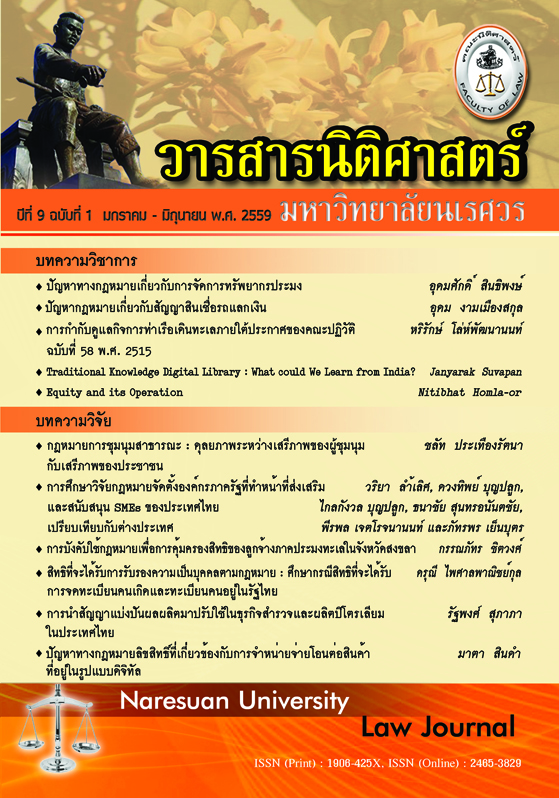The Law of Public Assembly : Equilibrium between the Freedom of Protesters and People
Main Article Content
Abstract
The objectives of this study are: 1) to study the concepts and principles of assembly in public and to undertake comparative study of public assembly law in target countries; 2) to study the context of public assembly in Thai society and compare various Thai groups’ recommendations concerning public assembly law and; 3) to suggest an equilibrium between the freedom of protesters and people. All data were collected from relevant documents and through two group discussions, one arranged in Bangkok and one in Roi Et Province. Target informants were academics, private sector individuals affected by public assembly, NGO personnel, lawyers, and judges. The research found that England, France, Germany, and South Korea have peaceful assembly provisions in their constitutions and laws, but the United States of America does not. Regarding public assembly in Thailand between 1932 and 2014, there are differences in the total number of public assembly. Various groups in Thailand hold differing views on public assembly law: freedom versus control. This study suggests the following measures: 1) there should be public assembly law that provides equilibrium between the freedom of protesters and people. 2) the freedom of assembly is an important principle that shall be guaranteed despite limitation in some cases. 3) the substance of public assembly law should require: that an organiser shall provide information about their demonstration; that duties of the organiser and a person who participates in a public assembly shall be identified; that officials should have authority to stop public assembly and the organizer should be able to appeal and; that the duties of the police and the body of knowledge of public assembly, the dispersal of the public assembly, the public assembly at night, places prohibited to public assembly, and penalty shall be specified
Article Details
References
National Human Rights Commission. Recommendation from national human Rights commission to government : A case of Baan-Krud and Bor Nok coal power plant and Thailand-Malaysia pipeline project 2004. Bangkok: National Human Rights Commission Office, 2007. [In Thai]
National Human Rights Commission. Report of the investigation of human rights : A case of violence in Thailand-Malaysia pipeline project. Bangkok: National Human Rights Commission Office, 2007. [In Thai]
Commission of Fact Finding. Report of commission of fact finding : A case of death in Takbai, Narathiwat province. Bangkok: OS Printing House, 2004. [In Thai]
Aimmayura, C. “Draft of Public Assembly act: And Rules that should be Included.” Chulniti Journal. 6, no.4 (2009): 59-70. [In Thai]
Sharp, G. Power, struggle and defence. Translated by Chaiwat Satha-Anand. Bangkok: KledThai Ltd, 1986. [In Thai]
Prachathai. "Criticizing 8 problems of draft of peaceful assembly act." Last modified 2014. Accessed April 4, 2014. www.prachatai.org/journal/2015/03/58468. [In Thai]
Nilaprapan, P. “Peaceful assembly law in foreign countries.” Journal of Administrative Law, 27, no.1 (2012): 3-68. [In Thai]
Pintobtang, P. Politics on road : 99 days of assembly of the Poor. Bangkok: Center for research and textbook of Krirk University, 1998. [In Thai]
Dhewanaruemitkul, P. Recommendation on social rule and the law of the freedom of peaceful assembly. Document in Seminar for Government and Social.11-12 September 2007 at Tulip Room Ramagarden Hotel Bangkok, 2007. [In Thai]
Tanrangsan, P. “Freedom of assembly : What will Thailand benefit from the public assembly act?.” Chulniti Journal. 6, no.4 (2007): 71-79. [In Thai]
Boonpong, Y. “Freedom of assembly.” Administrative Court Journal. 11, no.3 (2011): 29-44. [In Thai]
Singto, V. “Law of assembly and demonstration law and administrative law enforcement spersing the assembly in Germany.” Administrative Court Journal. 27, no.1 (2010): 106-129. [In Thai]
Charoenchaiyong, V. “Law of the freedom of assembly.” Thesis Master of Laws, Chulalongkorn University, Faculty of Law, 1996. [In Thai]
Kanitkasen, V. March. “Limitation of the freedom of peaceful assembly in Germany and in Thailand.” Nitisart Journal. 40, no.1 (2011): 130-152. [In Thai]
Chaiyasan, V. People Politics : Development of participation in politics, participatory democracy and political pluralism. Bangkok: Mekkao, 2002. [in Thai]
Vatanapradit, V. “Freedom of peaceful assembly without arms.” Journal of Bandit Suksanitilart. 20, no.1 (2008): 341-352. [In Thai]
Chiangkul, V. “14 October movement.” Thammasat Journal. 19, no.2 (1993): 139-147. [In Thai]
Techanan, S. England politics system. Bangkok: OdianStore, 1986. [In Thai]
PreechaSilpakul, S. Freedom of peaceful assembly without arms. Bangkok: Constitution Court, 2014. [In Thai]
King Prajadhipok’s Institute. Building Reconciliation in Thailand. Bangkok : Kingprajadhipok’s Institute, 2013. [In Thai]
Promchom, S. “Freedom of peaceful assembly and international principle in terminating an assembly.” Chulniti Journal. 11, no.1 (2014): 165-177. [In Thai]
Jingjit, S. and Tantisoonthorn, T. Public assembly. Bangkok: Institute of Public Policy Studies, 2012. [In Thai]
The Secretariat of The House of Representative. "Right and liberty and duty of people in democracy." Last modified July, 2013. Accessed May 1, 2014. www.parliament.go.th/ewtadmin/ewt/parliament_parcy/download/article/article_
20130730155120.pdf. [In Thai]


